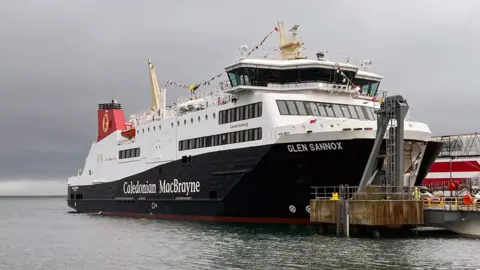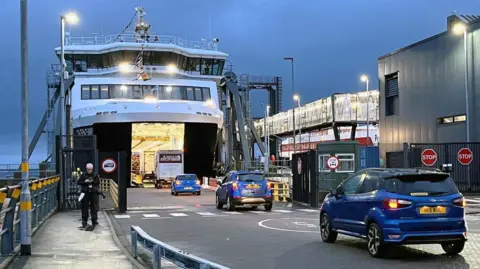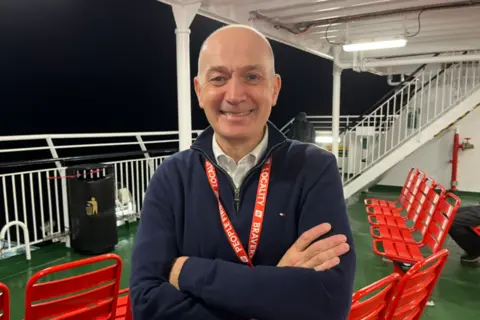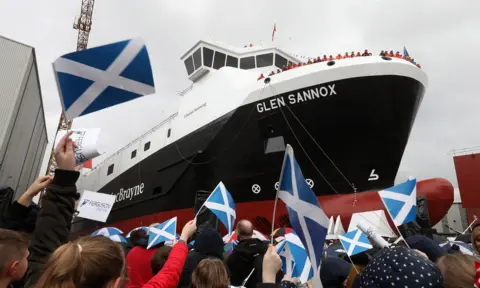Delayed island ferry Glen Sannox begins sailings
The ship at the centre of Scotland's long-running ferries saga has started carrying passengers between the Scottish mainland and the island of Arran.
MV Glen Sannox - which was meant to be delivered almost seven years ago - is the first new large vessel to join the UK's largest ferry fleet in nearly a decade.
It made its first scheduled journey between Troon in South Ayrshire and Brodick on Arran before dawn, coping with rough conditions that kept other ships in port.
The vessel will make three return sailings each day, with the journey lasting 75 minutes, helping to end years of uncertainty on one of Caledonian MacBrayne's busiest routes.
With space for 127 cars and 852 passengers, Glen Sannox brings much-needed extra capacity for the state-owned ferry operator which has struggled in recent years to maintain services with ageing and increasingly unreliable vessels.
The orders for the dual-fuel ships Glen Sannox and its sister vessel Glen Rosa, were placed with the Ferguson shipyard in Port Glasgow nearly a decade ago.
But acrimonious disputes over the design challenges and claims for extra costs saw the shipyard fall into administration and nationalised in 2019.
The ships have ended up costing more than four times the £97m contract price and sparked arguably the longest running political row of the devolution era.

CalMac chief executive Duncan Mackison told BBC Scotland News that the successful first sailing was a "big sigh of relief" and "good news for lots of different people".
"We're delighted that she's in the condition that she is," he added.
The first pre-dawn sailing out of Troon took place in challenging conditions with winds gusting at 40mph.
Passengers clutched onto handrails when moving about the ship, a few passengers felt a little queasy - and for those with stronger stomachs, the breakfast trays slipped precariously about on the tables.
But despite the choppy conditions, the verdict of passengers was overwhelmingly positive.
"It has the feel of a cruise ship," said Kenny Browne as he shared a champagne breakfast with his wife Nicky.
"Everyone's waited so long for the ship, so we just wanted to be here to celebrate."
Elsewhere a group of construction workers on their way to Arran for a team building day toasted the ship's arrival with cans of lager and were singing by the time it berthed in Brodick.
Mr Mackison said Glen Sannox would make big difference to islanders because it was capable of sailing in more challenging conditions.
"This new generation of ships are more powerful and have more sophisticated thrusters which enables them to get along under more challenging conditions and stronger winds," he explained.
Named after an Arran beauty spot, the ship is the fourth island passenger vessel to bear the name Glen Sannox.
An identical vessel, Glen Rosa - still under construction at the Ferguson shipyard in Port Glasgow - is due to join it on the route at the end of the year, although it was reported at the weekend that a new delay will be announced shortly.
Glen Sannox actually carried its first passengers on Sunday afternoon when it was unexpectedly switched for the scheduled vessel for one return sailing as a test run.
For residents on the island, Monday's start of a full timetable of sailings should bring relief after years of transport uncertainty.

Mike Dobson, chairman of Arran Cancer Support, said it had been particularly difficult few years for those needing hospital treatment on the mainland.
"An ageing ferry fleet with lots of technical or weather-related problems has made it more difficult for people to feel that they are going to get there," he told BBC News.
"It's meant more cancellations of appointments and that bears a certain weight on people and affects their mental health."
Sheila Gilmore, from Visit Arran, said businesses had also been badly affected, but she was optimistic visitor numbers will now start to recover.
"We are very hopeful, it's been a long struggle to get here but we have to look forward and put what is in the past behind us," she said.

Scotland's entire west coast ferry network should also benefit as the average age of the fleet starts to fall, and other vessels can be redeployed.
For SNP politicians there will be hope the arrival of Glen Sannox heralds the end of Scotland's long-running ferries controversy, although reports of new delays for Glen Rosa mean that may be premature.
The contract to build the two ships was awarded to Ferguson's in 2015, a year after it went bust shortly before the independence referendum.
It had been rescued by an investment firm led by Jim McColl, an economic adviser to the then First Minister Alex Salmond.

While a decade of decline had left the Clyde's last commercial shipyard with just 76 staff when it went into administration, the businessman delivered millions of pounds of investment and rapid expansion.
But construction of the dual-fuel ships soon faltered as the firm grappled with complex design challenges while trying to hit production milestones and modernising run-down facilities.
Claims for extra costs led to a bitter standoff between the yard's management and state-owned ferries procurement body Caledonian Maritime Assets Ltd (CMAL).
Glen Sannox was launched by former first minister Nicola Sturgeon on a blustery day in November 2017, but behind the scenes a bigger political storm was brewing.
It later emerged the ship was far from finished - windows were painted on, temporary funnels were made of plywood and, more importantly, huge amounts of engineering and electrical work were still required inside.
The yard's managers blamed CMAL, claiming a poorly-developed concept design, late decision-making and interference had led to unforeseen complications.
CMAL said the firm had simply underestimated the complexity of the task entrusted to it and made poor management decisions.

The deadlock eventually saw Ferguson's run out of money and fall back into administration in 2019, with the shipyard nationalised, saving 350 jobs.
Problems continued under new "turnaround director" Tim Hair who was paid nearly £2m before a permanent chief executive was appointed in 2022.
Opposition parties, meanwhile, claimed the crisis had its roots in incompetence by Scottish ministers - which they denied.
Under new boss David Tydeman, the ships' construction eventually made progress but with more huge cost increases and repeated delays.
He was sacked by the Ferguson board last March, and the ship was finally delivered to CMAL, after several more short delays, in November.
 PA Media
PA MediaGlen Sannox is the first dual fuel ferry built in the UK capable of running on both marine gas oil (MGO), a form of diesel, and liquefied natural gas (LNG).
When running on gas the ship's engines are quieter and emit far lower levels of exhaust pollutants known as NOx and SOx.
The climate change credentials of LNG, however, are questionable as the engines also release methane, which is a greenhouse gas far more potent than CO2.
The LNG fuel also has to be imported from Qatar and trucked up to Scotland from a terminal in Kent.
The size of the ship means it is currently unable to berth at Ardrossan, the closest mainland port to Arran, unless agreement is reached on a multi-million harbour redevelopment.
In addition to Glen Rosa, four other large CalMac ships are being built by a large shipyard in Turkey - though they are also delayed, by about six months.
The first of those ships, MV Isle of Islay, should be delivered in the spring, with the others following on about four months apart.
